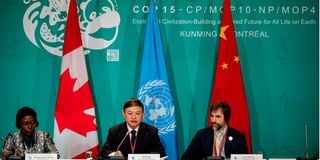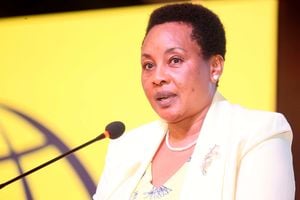Why Africa should speak for the future of their forests

From left: Executive Secretary of the UN Convention on Biological Diversity, Elizabeth Maruma Mrema; Chinese Ecology and Environment Minister, Huang Runqiu; and Canadian Minister of the Environment and Climate Change, Steven Guilbeault, hold a joint press confrence at the UN Biodiversity Conference (COP15) in Montreal, Quebec, Canada on December 17, 2022.
Forestry and conservation experts are gathered in the Colombian city of Cali this week to reflect on ways of preventing further disappearance of forest covers and diversity across the world. But for African leaders, this should be an opportunity to speak for their own, and how to protect them.
The meeting, the 16th such conference, will run from October 21 to November 1. It is officially known as the COP16 United Nations Conference on Biodiversity and brings together decision-makers on forestry issues, among other conservation concerns.
Charly Facheux, vice-president of the African Wildlife Foundation (AWF), an NGO specialising in nature conservation issues, says only one voice from African concerns will help them address the issue properly.
"I have had the advantage and opportunity of witnessing several COPs (UN climate conferences) and I can tell you that more and more, Africa is making the effort to speak with one voice," he told The Eastafrican in Kinshasa last week ahead of the conference in Colombia.
Africa is home to a quarter of the world's mammal species, a fifth of the world's birds and a sixth of the world's plants. According to some researchers, the African rainforest, the Congo Basin, is now ranked first, ahead of the Amazon, because it sequesters more carbon dioxide per hectare per year. The ecosystems of the African continent constitute a formidable element of diplomatic soft power that would enable Africa to carry weight in international negotiations on biodiversity.
According to Facheux, the African continent has realised the need to harmonise its points of view when it comes to negotiating global issues such as nature conservation and the fight against climate change.
“Africa has started to set up a group called the Negotiators' Group, which discusses important issues so as to have common points of view. For some time now, the AWF and other partners have been helping to set up and strengthen this group.
“You will also be aware that about two years ago, at the Convention on protected areas, the idea was always to have common positions. We obviously feel that this will not always be the case, but what is important is to realise that Africa has gone through a period where it realises that we are stronger together, we can go further together.”
At the last United Nations Convention on Biodiversity, COP 15, held in Canada, the Democratic Republic of Congo, for example, declared itself disappointed by the agreement that emerged from the talks.
In reality, despite the main commitment by all the countries to preserve 30 percent of their land by 2030, and despite the promise to mobilise $30 billion by 2030 to finance the protection of Africa's natural resources, doubts persist as to the real willingness of the developed countries to honour these commitments.
“Africa has now clearly determined the resources it needs to implement its policy. One of the things that was very often blamed on Africa was the lack of a clear assessment of our needs in terms of implementing national strategies.
“This is no longer the case. I think that African countries have done an enormous amount of work in developing national strategies and evaluating them. The problem now is to put the strategies in place to attract the maximum amount of resources. I also said that Africa has also changed its approach, we no longer go to these kinds of discussions as applicants, and that's what's important.”
In the past, the African continent had a bitter experience: Africa only benefited from 7 percent of the Global Environment Facility (GEF), a slice of China's quota. There are no distribution keys for the 430 billion to be raised, however, which means negotiation skills are important.
“Everything will depend on what is put on the table and what is clear and fair. Africa has understood this and has started to develop national strategies. That's the first thing, and that's what's important. But now this strategy must not just be theoretical, it must be based on clear and precise facts.”
The ongoing Convention on Biodiversity in Colombia, he argued, can be an opportunity for intercultural exchange, because preserving biodiversity is a crucial issue for the entire humanity.





